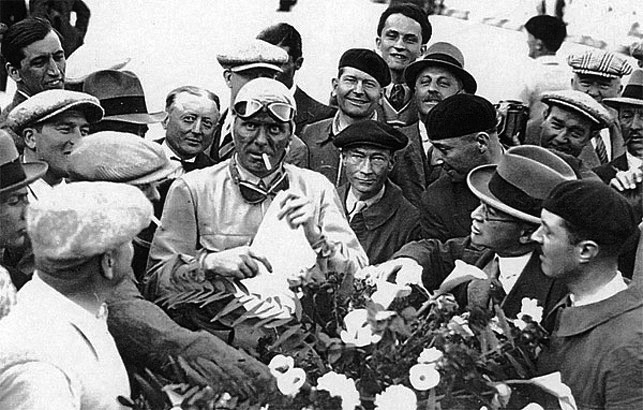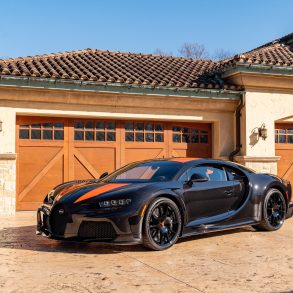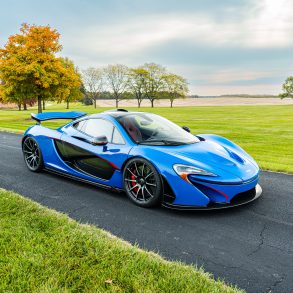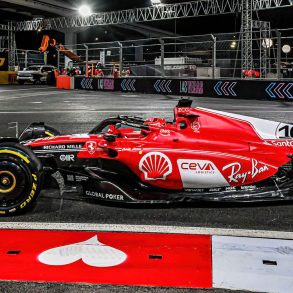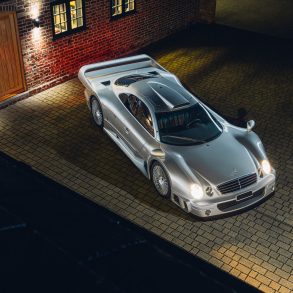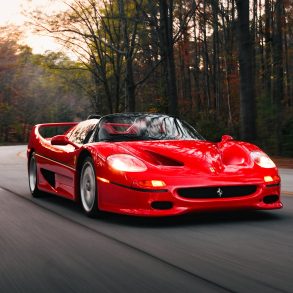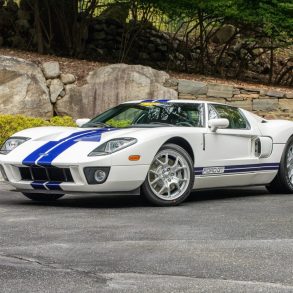1933 Tripoli Grand Prix – The Race That Was Rigged
By Alfred Neubauer from Speed was My Life
It was in 1933 that the giant American airship Akron crashed in the Atlantic with all hands aboard. Thirteen years of Prohibition ended in the United States. In Germany, the cruiser Admiral Scheer was launched. Goebbels imposed a boycott on Jewish businessmen and the first concentration camps were established. And in the Italian colony of Libya, Italo Balbo opened the new racing circuit at Tripoli, the fastest in the world.
Unlike the narrow, twisting course at Monte-Carlo, the Tripoli circuit was 8 ¼ miles long. You could keep up a speed of 120 m.p.h.- and break your neck. The drivers were well aware of this. So, too, were the authorities. They wanted sensational publicity for Italy, for Mussolini’s ‘Roman Empire’ and especially for Marshal Balbo, the new governor of Libya, the elegant sportsman who had mapped out a brilliant future for himself.
A national lottery was organized. Months before the race, tickets were already for sale throughout Italy. For the ridiculous sum of eleven lire you stood a chance of becoming a millionaire. Three days before the race thirty lucky tickets were drawn, one for each of the starters. The winning ticket would win seven and a half million lire, about £8o,ooo. On the eve of the race, a stout, bald headed gentleman called at Achille Varzi’s hotel and asked to see him. He was shown up. Varzi was resting on a couch in his private sitting room, as immaculate as ever, his hair parted in the middle and smoothly brushed. He was wearing a light-blue smoking jacket and a white scarf with a genuine pearl scarf-pin. With him that evening was a beautiful young woman, whom I shall call Sophia, and who was to play an important part in Varzi’s life.
The stranger introduced himself as Enrico Rivio, a timber merchant from Pisa. He asked to speak to Varzi alone, and Sophia retired to the bedroom. Then Rivio explained why he had come: to ask Varzi to win the race next day. It’s not hard to imagine Varzi’s reaction. He was surprised that Signor Rivio should have flown especially from Pisa to Tripoli just to make that request! But there was more to it that. Rivio had drawn the lottery ticket with the number of Varzi’s car. Varzi remarked, not without a certain bitterness, that the most he stood to win from what promised to be a dangerous race was a great deal less than Signor Rivio, the timber merchant, would get out of it. And that was the point where Rivio put his cards on the table. If Varzi won, he could have half the lottery prize money. Moreover, he produced a document, drawn up by his solicitor, to that effect. Varzi thanked him, promised to do what he could, and, as soon as Signor Rivio left the room, telephoned Nuvolari….
On May 7, 1933, at Tripoli, it was nearly 100 degrees in the shade. The hot desert wind, the Ghibli, was blowing across the plain. The new circuit ran like a white ribbon between the palm groves and the yellow sand. The grandstand was ablaze with colour, Italian officers in their gaudy uniforms, colonial officials, Blackshirts, Arab sheiks and women in all their finery.

As Marshal Balbo, resplendent in his uniform, his beard dutifully trimmed, raised the green, white and red flag, the thunder of thirty racing cars echoed across the desert. And what followed must be unique in the long and varied history of international motor racing.
Three cars led the field from the start: first, there was Nuvolari in his red Alfa Romeo, then Borzacchini close behind, followed by the ace Campari, who possessed a sufficiently good tenor voice to sing at La Scala in Milan and had a uncle who was a famous liqueur manufacturer.
Others who got off to a good start were the Frenchman Louis Chiron, Fagioli and Sir Henry Birkin in his green Maserati. The favorite, Achille Varzi, was somewhere in the middle of the field and seemed quite happy to stay there. Among the onlookers some suspected he might be off form, others that he was simply biding his time.

Two laps later, Campari’s engine began to splutter. He stopped at the pits and the mechanics dived under the bonnet, like flies. A few moments later Campari eased his bulky figure out of the driving seat his face purple with rage. But not long after, he was seen in the canteen with a bottle of Chianti in front of him and his fury seemed to have passed.
On the twentieth lap Nuvolari was still in the lead, with Borzacchini on his tail and Chiron and Birkin not far behind. There were another ten laps to go, and Varzi now put on a spurt. By the twenty-fifth lap he had moved up to third place and Chiron and Birkin had dropped back.
One can well imagine Varzi’s feelings. This was something he had not reckoned with. His Bugatti engine began to make ominous noises. Two cylinders were dead. The car was slowing down. To stop for a change of plugs would mean losing three or four minutes, and the race. He decided to keep going. But what agonies Signor Rivio must have suffered.
At the end of the twenty-sixth lap the crowd were shouting Nuvolari’s name, and that flying devil from Mantua looked like lapping Varzi. Then, on the twenty-seventh lap Borzacchini was seen to be looking back anxiously, as if he were afraid Varzi would pass him. And yet Borzacchini was not driving full out, and Varzi’s car was obviously limping along.

Nuvolari entered on the last lap thirty seconds ahead of Varzi. With a mile and a half to go the crowd noticed that Nuvolari was also throwing anxious glances over his shoulder. They cheered him on wildly. When his Alfa appeared at the beginning of the home straight they went mad with excitement. But the shouting quickly died away when they saw the red Alfa slow down and stop only a few hundred yards from the finish. Nuvolari climbed out of the car and stood in the middle of the track, wringing his hands.
‘No petrol,’ he howled, ‘No petrol’
Mechanics rushed out of the pits with petrol cans and emptied them into the tank. While they were doing so two cars came in sight round the bend, Varzi’s and Chiron’s. Both were crawling. And the bewilderment and suspense were indescribable, as Nuvolari joined in this fantastic slow-motion finish. Varzi won, literally by a tyre’s breadth from Nuvolari with, Birkin third. In the general excitement it had been forgotten that Chiron was one whole lap behind.
Varzi, bathed in perspiration and completely exhausted, was lifted out of his car and carried shoulder high to receive his prize. Among the first to congratulate him on his victory was a stout, bald-headed gentleman whom nobody knew – Signor Rivio.
That evening, as Varzi, Nuvolari and Borzacchini sat in their hotel drinking the most expensive champagne, the rumours began to gain ground. Where they originated no one will ever know but in a remarkably short time there was talk of a rigged lottery and a racing scandal in the newspaper offices and the racing headquarters.
The following morning the supreme sport authority in Tripoli met in special session. The President opened the proceedings with a direct charge that certain drivers had agreed before the race that Varzi should win. One of his colleagues asked who the ‘certain drivers’ were. The President named Varzi, Nuvolari and Borzacchini as the main culprits, with Campari and Chiron as strong suspects, and he demanded that all these drivers should be immediately disqualified and have their competition licenses withdrawn.
There was a long, uneasy silence. To disqualify these five drivers, the finest in Europe, really meant disqualifying international motor racing. The proposal was not even put to the vote. The drivers in question were merely given a warning. From then on, new and stricter regulations were introduced. The thirty lottery tickets were to be drawn in future five minutes before the race started, when the drivers were already in their cars.
Twenty-five years later, Canestrini, who, by settling the feud between Nuvolari and Varzi had unwittingly prepared the ground for this coup, found that it was perfectly legal and helped to stimulate motor racing! My own view is that, technicalities aside, any chance to increase the earnings from such a dangerous profession is worth taking. Good luck to them!
Varzi and Nuvolari were by no means paupers, but they could still use a million lire. With little Borzacchini it was different. This was the first time he had come by such a large sum of money. But he was not to enjoy it for long. He had sworn that he was finished with motor racing. A fortnight later he was back at the wheel of his Alfa Romeo. On September 19, of that year 1933, he took part in his last race.
1933 Tripoli Monaco Grand Prix Results
| 1st | Achille Varzi | Bugatti | 2 hr. 19 min. 51 sec (104.7 mph) |
| 2nd | Tazio Nuvolari | Alfa Romeo | |
| 3rd | Sir Henry Birkin | Maserati | |
| 4th | Giorgio Battilana | Alfa Romeo | |
| 5th | Piero Taruffi | Alfa Romeo |
Alfred Neubauer is a legend in the history of motorsports. In fact much of what the great man has written including this story can be considered more legend than fact but taken as a whole Speed was my Life is history writ large.


